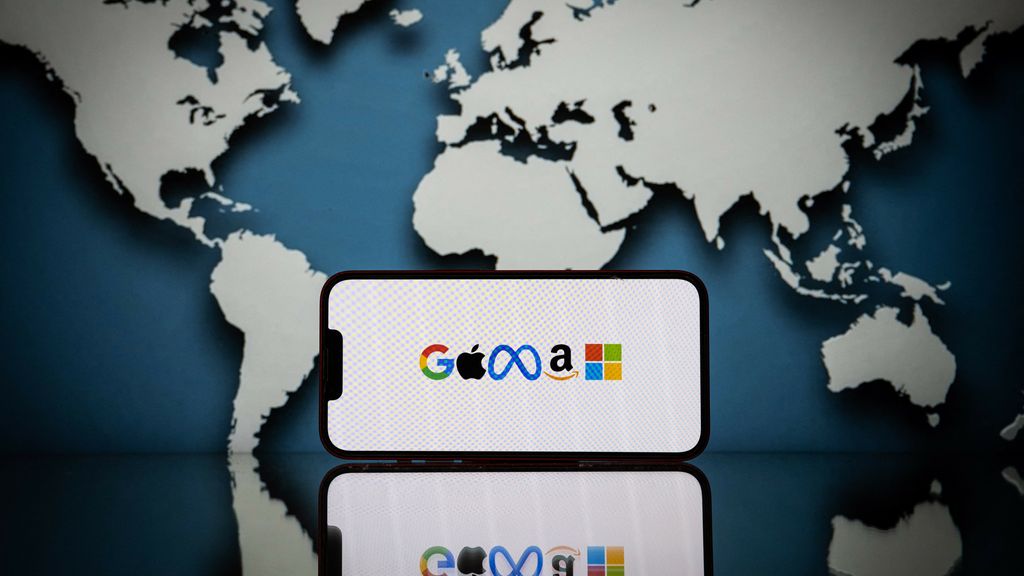
This article was last updated on April 29, 2025
Canada: ![]() Oye! Times readers Get FREE $30 to spend on Amazon, Walmart…
Oye! Times readers Get FREE $30 to spend on Amazon, Walmart…
USA: ![]() Oye! Times readers Get FREE $30 to spend on Amazon, Walmart…
Oye! Times readers Get FREE $30 to spend on Amazon, Walmart…
Table of Contents
Fines and lawsuits: Large tech companies are under fire in Europe and the US
The beloved innovators were once, now Apple, Google and Meta (from Facebook and Instagram) are under fire because of their position of power. And not only in critical Europe, but also in the United States. There is a lot at stake: billions of fines and even the chance that the tech giants will lose important parts.
The newest European weapon to tackle large tech companies is the Digital Market Act (abbreviated to DMA in English). This week The first fines Delivered: Apple has to pay 500 million euros and Meta 200 million. The European Commission’s decisions follow just over a year after the new rules had taken effect.
And that is unprecedentedly fast: normally procedures about the dominant position of companies take years, both in Europe and the US. Although the bosses of the tech giants during the inauguration of President Trump a place of honor Had the authorities are not standing there either: there are several things against the large tech companies.
Cut -up
The Americans also look at other ways to break their power: cutting them up. That’s how the American justice wants Google farewell From his internet browser Chrome. In this case it is about making makers of Android smartphones obliged to install the Google search engine. In 2018, Google already received a record fine in Europe in a similar matter 4.3 billion euros.
Something similar is meta above the head. According to the American regulator, the company bought its competitors Instagram and WhatsApp with the aim of them remove. If the acquisitions are reversed, Meta loses two important parts.
That is not completely new: in 2000 the judge ruled that Microsoft had to be split into two parts. That was because the company had abused his dominant position with Windows. In the end, this was canceled: Microsoft arranged, so Windows could remain part of the same company.
“The disposal of parts is drastic,” says Inge Graef. She is a specialist in the field of abuse of power and competition at Tilburg University. “With that they try to restore the situation before the abuse of power. The question is whether that will work out. And whether it will be useful in the long term. Ultimately, you want the companies to adhere to the rules, so that it does not happen again years later.”
You can already see that the DMA works if you use services from the large tech companies, she explains. “For example, if you google a location. Then you no longer see Google Maps automatically. That is done so that other card services get more room. As a user you now have to put a little more effort into it. You may think: ‘What annoying’. But in the long term it leads to more competition, more freedom of choice and therefore less dependence on Google. That is the purpose of European law.”
‘Companies must adjust behavior’
What mainly helps is to ensure that companies adjust their behavior, says Graef. The European Commission therefore not only imposed a fine on Apple, but also set a deadline to adjust the behavior. And Meta already came during the research with an extra choice for Facebook and Instagram users. “That is more effective than fines,” says Graef. “The companies will still challenge them at the court.”
Google did that with a fine from 2017 in a case of Google Shopping: the price comparison for products in web stores. Last September the judge ruled that Google final 2.4 billion euros Having to pay because it was on its own service to the competition.
In another case it was good for Google: the company needs a fine of almost 1.5 billion euros unpaid. The judge put a line through that fine from 2019 because the European Commission had not properly figured out that the behavior of the company would be detrimental to consumers.
And that’s what it’s all about, says Graef. “The aim of these rules is that consumers and companies are not dependent on a few large parties. If competitors get more room, there is more to choose from us.”
Other lawsuits in US:
The regulator complained Web store Amazon Because those own brands (such as the E-reader Kindle and the video doorbell ring) placed higher in the search results than competing products. It is still unclear when the case will come to court. In addition to a monopoly on the market for search engines, Google also has a monopoly in the online advertising market, a judge ruled this month. In a follow -up case it must become clear what should be done now. According to the American justice Apple With his iPhone, the competition pushed away in different ways, partly because smartwatches from other brands would work less well with the phone.

Be the first to comment